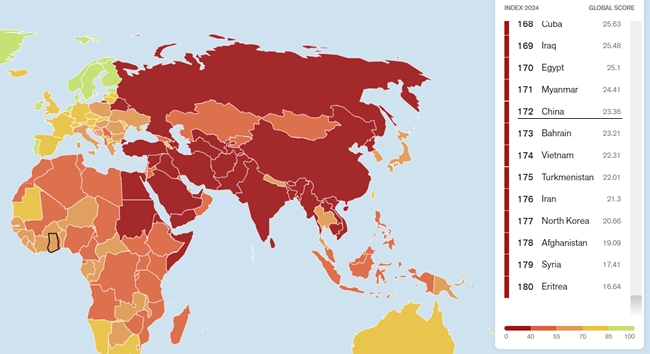
The business weekly Zimbabwe Independent is published by Alpha Media Holdings, which describes itself as “an independent media house free from political ties or outside influence,” one that strives to “deliver the facts” and “include all relevant opinions and ensure that no significant strand of thought is neglected.”
Are AMH’s outlets managing to fulfill this mission despite “restrictive laws” in Zimbabwe that undermine constitutional protections of freedom of speech and “contribute to self-censorship among journalists”?
A May 17, 2024 commentary in Zimbabwe Independent, “China doubles down on suppressing press freedom…,” suggests that the paper’s ability to report and speak as it will is real, even if partial.
The unnamed author reports that as of World Press Freedom Day, celebrated on May 3, “disturbing new reports underscore how China remains the world’s worst jailer of journalists and writers. The latest World Press Freedom Index from Reporters Without Borders (RSF) ranked China near the very bottom at 172nd out of 180 countries and territories surveyed.”
The RSF report slammed the Chinese Communist Party’s (CCP) strict censorship policies, stating it “continues to exercise strict control over information channels, implementing censorship and surveillance policies to regulate online content and restrict the spread of information deemed to be sensitive or contrary to the party line.”…
This suppression of press freedom appears to be worsening under Xi Jinping’s authoritarian rule. RSF noted that while China’s numeric ranking increased slightly compared to last year, this was solely due to the deteriorating situations in other nations like Afghanistan and not because of any positive reform from Beijing….
A new report from PEN America found China jailed over 100 writers in 2023, the highest number by any country. Among those imprisoned were 50 online commentators charged with the absurdly vague “crime” of “picking quarrels and provoking trouble” for merely sharing opinions on social media.
The author argues that China’s “assault on journalists and authors is an assault on truth itself” and that “the international community” is morally obliged to condemn China’s war on press freedom. “Journalists and writers unjustly jailed or disappeared must be immediately freed.”
The piece concludes, though, with an odd and perhaps inadvertent concession to China’s dictatorial system: “So long as this oppression continues, the so called made-in-China authoritarian capitalist prosperity can never be embraced as a legitimate model of governance over and above liberal democracy.”
If oppression of journalists and other speakers in China for uttering government-unapproved opinions were to cease, would this mean that China’s “authoritarian capitalist prosperity” could then be “embraced as a legitimate model of governance over and above liberal democracy”? The apparent implication raises many questions. For example, what about all the other oppressive features of China’s “model of governance”?
These other features might not last very long, at least not in their present most severe forms, if open discussion were ever really and truly allowed and protected in China. But no totalitarian government that wants to maintain its power can permit unfettered, never-punished criticism of itself.





